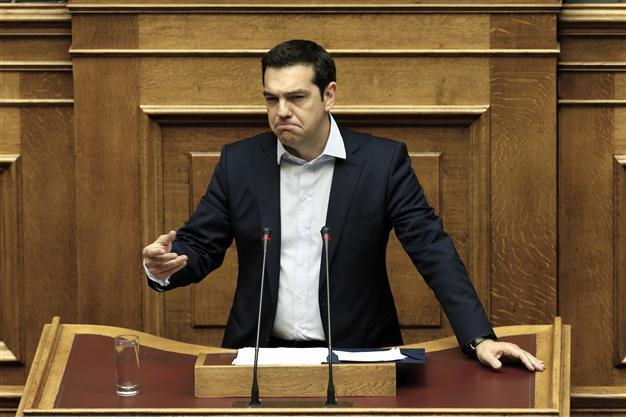Greek PM makes new bailout offer after IMF default
BRUSSELS - Agence France-Presse

AP photo
Greek Prime Minister Alexis Tsipras made a fresh reform proposal to eurozone ministers on July 1 after Greece became the first advanced economy to default on an IMF payment.
Eurozone ministers were to consider the latest gambit by the leftist premier in a conference call later July 1 even as debt-stricken Greece's creditors poured cold water on the latest plan.
German Finance Minister Wolfgang Schaeuble effectively ruled out all negotiations, saying that no Greece deal was possible before Sunday's Greek referendum on bailout terms.
"First of all Greece must clarify its position on what it wants, and then we will have to talk about it, under conditions that are now far more difficult," Schaeuble told a Berlin press conference.
The crisis is hitting hard in Greece, where banks will be closed all week, although around a thousand branches opened July 1 to allow the elderly to receive pension payments.
The Greek proposal was sent by Tsipras to heads of the institutions that have overseen Greece's two bailouts worth 240 billion euros since 2010, just as the European part of the EU-IMF bailout expired.
"The Hellenic Republic is prepared to accept this... agreement subject to the following amendments, additions or clarifications," the letter said, referring to the reforms-for-cash contract binding Greece with its creditors.
The government said any deal would have to allow Greece to maintain a 30 percent VAT discount on islands and postpone a 2012 pension reform until October 2015.
But Schaeuble pointed out that the proposal "doesn't exist anymore and never existed" -- because the European offer in question was rejected by Athens last week and the aid programme formally expired on June 30 night.
Greece is seeking a new two-year bailout package worth nearly 30 billion euros to avoid pushing it further towards an exit from the eurozone a day after it failed to make a 1.5 billion euro ($1.7 billion) payment to the International Monetary Fund.
The missed payment underlined the failure of more than five months of wrangling between Greece's radical left government and its creditors to reshape its bailout and prevent it dropping out of the eurozone.
European leaders also want Tsipras to drop Sunday's referendum, in which the embattled far-left government in Athens is asking voters to say 'No' to reforms demanded by Greece's creditors.
Greek officials have indicated they would be willing to suspend it if July 1 talks produce an eleventh-hour agreement on the new funding request.
Ratings agencies cut their ratings on Greece's debt as the chaos mounted, predicting it will return to recession this year.
In Athens, around 20,000 people braved torrential rain late June 30 to turn out to show their support for a bailout deal.
Despite the opening of some banks for the elderly the only option for everyone else was to queue -- sometimes for hours -- at cash machines to withdraw a maximum of 60 euros a day.
The ongoing uncertainty hit European stocks and the single currency on June 30.
But in Asian trade on July 1, the euro held steady buying $1.1136 compared to $1.1139 in New York late June 30.
The European Central Bank's governing council will also meet on July 1 to discuss the crisis in Greece.
It was the ECB's decision on Sunday to refuse to increase emergency funding for Greek banks that pushed Athens to close lenders and impose the capital controls.
The ECB is thought likely to stick with its current stance on Greek banks but could take measures to prevent contagion in other eurozone markets.
Greece has now entered uncharted waters without financial assistance from either the EU or IMF for the first time in five years.
An IMF spokesman in Washington confirmed the payment due by 2200 GMT June 30 had "not been received," making Greece the wealthiest ever to default to the Washington-based global lender.
"We have informed our executive board that Greece is now in arrears and can only receive IMF financing once the arrears are cleared," Gerry Rice said in a statement.
The IMF is now considering extending Greece's payment deadline -- something it has only done twice before in 1982 for Nicaragua and Guyana -- giving it the power to ease pressure on Athens as it starts fresh talks with the EU.
